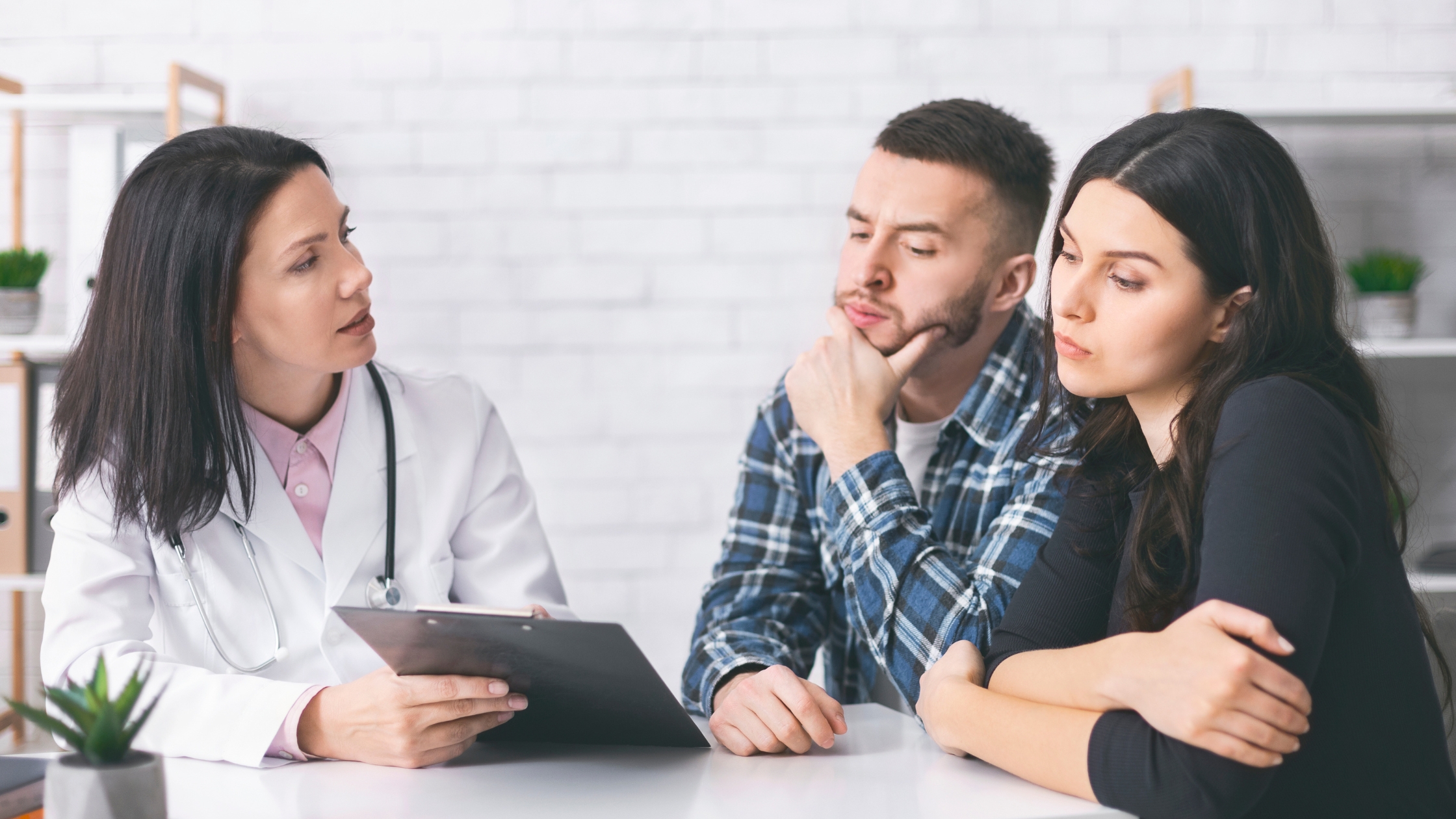
For individuals considering whether or not to become an egg donor, it may be a relief to hear that donation risks are relatively mild in most cases. Some patients may experience discomfort during the initial hormone stimulation process, but it is generally similar to what they would encounter during their normal cycle. The risks associated with egg donation are minimal, but it’s important for potential donors to understand the possible complications of donating eggs so they can be informed, educated, and confident when it’s time to sign consent forms. Keep reading this guide for a breakdown of the potential risks of donating eggs and factors that increase a donor’s likelihood of experiencing adverse side effects, and answers to common questions associated with egg donation risks.
The Risks Associated With Egg Donation Medications
During the egg donation process, you will have multiple blood draws throughout the process, which can include FDA labs and genetic testing. You will also be required to take a series of egg donation medications, which are hormones that will both stimulate your body’s production of mature eggs and suppress ovulation so that you don’t release any eggs from your ovaries into your fallopian tubes.
Here are a few of the potential side effects.
Side Effects Of Self-Administered Injections
Egg donation medications are typically self-administered into the fat beneath the skin using a subcutaneous needle, usually in the abdomen or at the thigh where there’s less sensitivity. You’ll inject yourself once a day for 10-14 days before your scheduled egg retrieval procedure.
Most people report minimal pain when injecting the hormones, especially when they are thoroughly instructed on how to administer medications. As a result, they feel less nervous about doing it.
As with any injection, there are common side effects such as redness, tenderness, and bruising that usually clear up in a day and are not cause for concern. Donors can minimize this by avoiding injecting in the same spot throughout the hormone treatment.
A rare side effect of needle injections is an infection. This can be avoided by using only one sterile needle per injection, disposing of the needle responsibly, and following proper injection practices.
Let your doctor know if you’re struggling to inject yourself. If you experience any flu-like symptoms, inform your doctor so that these issues can be addressed right away.
Side Effects Of Follicle Stimulation & Ovulation Suppression Hormones
More common side effects of egg donation hormones are similar to those associated with menstruation and hormonal birth control pills. These side effects, which are usually temporary, include:
- Breast soreness
- Sadness and/or irritability
- Nausea
- Increased appetite
- Temporary weight gain
- Oily skin or acne
- Spotting at unexpected times
- Changes in sex drive
- Fatigue
- Swelling
- Headaches
- Ovarian cysts
Rare side effects include blood clots, an allergic reaction, and ovarian hyperstimulation syndrome.
You will come into the office several times while taking hormones to monitor how your body responds to the medications. Do not hesitate to call your doctor’s office if you’re experiencing any type of moderate to severe reactions to medications.
Important Note: Follicle-stimulating hormones cause people to become especially fertile, increasing the risk of pregnancy and the chances of having multiple eggs fertilized at once. Becoming pregnant during this time could be painful and dangerous. We strongly recommend that donors abstain from intercourse altogether during this time to remove the risk of getting pregnant.
Ovarian Hyperstimulation Syndrome: A Rare But Potentially Serious Egg Donation Risk
Ovarian hyperstimulation syndrome (OHSS) occurs when the body over-responds to follicle-stimulating hormones. When this happens, the ovaries enlarge and an excess of fluids from the ovaries leaks into the abdomen.
OHSS symptoms range from mild abdominal discomfort to breathlessness and affected liver and renal functions. Severe OHSS (OHSS requiring hospitalization) occurs in less than 1% of donors worldwide and less than .01% of donors at The World Egg and Sperm Bank due to our specialized systems and donor-first approach to care.
To minimize the risk of OHSS as much as possible, The World Egg and Sperm Bank closely monitors how each donor’s body responds to medications and adjusts them as necessary.
Risks of Donating Eggs During Egg Retrieval
While the egg retrieval procedure is minimally invasive, it is a medical procedure and will come with risks.
Prior to the retrieval, you will be placed under twilight sedation that has the potential to carry a small risk of allergic reaction. Please advise your doctors and medical staff of all allergies before beginning any medications or treatment.
As with any surgical procedure, there’s a small risk of infection. To minimize this risk, your doctor will administer an antibiotic before beginning the retrieval.
Post-Retrieval Risks Of Egg Donation
After the procedure, you may feel menstrual-like symptoms such as cramps, bloating, spotting, or general pain. This is why donors are advised to relax for 1-2 days post-retrieval.
There’s also a small chance of infection as you’re healing, but this is true any time you have wounds, even a paper cut.
Someone from your doctor’s office will check in on you after the procedure. Always contact your doctor if you experience a fever, shortness of breath, extreme bloating, significant spotting, or any other symptoms that feel abnormal.
FAQs: The Risks of Donating Eggs
Is Being an Egg Donor Painful?
For most, the answer is typically no. It is generally not painful to become an egg donor, but it can vary person to person.
If you are apprehensive around needles, administering the injectable hormones may be more difficult. That is not to say it can’t be done! Side effects of the injectable medications may cause the donor to experience menstruation-like symptoms, but these are mild and manageable.
During the egg retrieval you will be under twilight sedation and will wake up with no memory of the procedure.
Are You Infertile After Donating Eggs?
Donating eggs does not cause you to become infertile. Read our post on having babies after donating eggs to understand why donating eggs does not affect your fertility.
What Happens To Your Body After Donating Eggs?
After donating your eggs, you may feel period-like symptoms such as bloating and discomfort. This usually clears up within a few days.
There is a small risk of ovarian hyperstimulation syndrome (OHSS), which results from an overreaction to hormone medications. Your doctor will work with you to minimize these risks and monitor how your body responds to hormone medications.
Do You Gain Weight From Donating Eggs?
You may experience temporary weight gain while on hormone medications, much like you may temporarily gain weight during menstruation. However, this will clear up within a few days after your donation.
Final Word On The Risks of Donating Eggs
While there are some risks of donating eggs, they are very minimal as long as your doctor or egg bank closely monitors how your body responds to hormone injections, teaches you how to properly administer injections, takes good care of you during egg retrieval, and monitors you post-retrieval.
That said, it’s essential to choose an egg donation facility that prioritizes donors. The World Egg and Sperm Bank is not a multi-service infertility practice. We do not provide fertility treatments or IVF services to intended parents, which allows us to focus solely on the needs and safety of donors. We are proud to maintain the highest standards for donor care and gamete quality.
If you’re considering egg donation, read our post on the requirements to be an egg donor. Don’t hesitate to contact The World Egg And Sperm Bank if you have any remaining concerns about the risks of donating eggs. We are here for you every step of the way!
Follow Us On Our Socials!
Check out our Instagram, Facebook, and LinkedIn pages to see our content and learn more!




